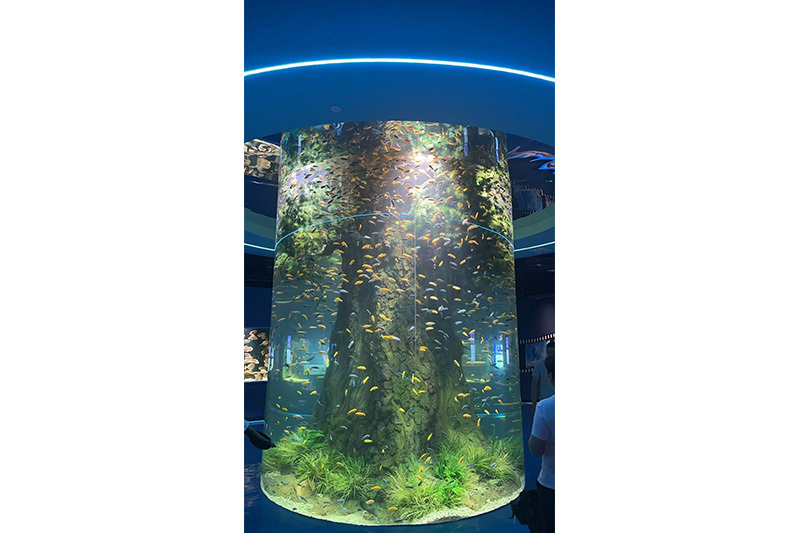
Understanding Acrylic Tunnels: Properties, Applications, and Benefits
Acrylic tunnels are cylindrical structures made from acrylic, a versatile thermoplastic known for its clarity, strength, and resistance to UV light. These tunnels are engineered through a process of extrusion or molding, resulting in a product that maintains excellent transparency while also being lightweight. The remarkable properties of acrylic include resistance to impact, making it a preferred
Release time:
2025-11-10
Acrylic tunnels are cylindrical structures made from acrylic, a versatile thermoplastic known for its clarity, strength, and resistance to UV light. These tunnels are engineered through a process of extrusion or molding, resulting in a product that maintains excellent transparency while also being lightweight. The remarkable properties of acrylic include resistance to impact, making it a preferred alternative to glass in various applications. Additionally, acrylic plastic can be easily fabricated, allowing for complex geometries and custom designs tailored to specific needs.
One of the primary applications of acrylic tunnels is in the field of horticulture and agriculture. These structures are often employed as greenhouse components, enabling controlled environments for plant growth. The high light transmission characteristics of acrylic allow for optimal sunlight penetration, promoting photosynthesis while providing insulation against temperature fluctuations. This makes acrylic tunnels an ideal choice for extending growing seasons in various climates.
Beyond agriculture, acrylic tunnels find applications in construction and architecture. They can serve as decorative elements or functional structures in landscaping and outdoor designs. Their lightweight nature facilitates easy installation, while their durability ensures long-term performance. Furthermore, the aesthetic appeal of transparent acrylic tunnels can enhance the visual aspects of urban or residential spaces.
In addition to their aesthetic and functional benefits, acrylic tunnels are also valued for their chemical resistance. This property makes them suitable for use in environments where exposure to various chemicals is a concern. They can withstand a range of substances without degrading, making them reliable in settings such as laboratories, industrial facilities, and even in certain medical applications.
When considering acrylic tunnels, it is important to understand the maintenance involved. While acrylic is resistant to many factors, it is prone to scratching and may require specific cleaning agents to maintain clarity. Regular upkeep can ensure that the tunnels retain their visual and functional qualities over time.
In summary, acrylic tunnels are an innovative and versatile solution in the plastics industry, with numerous applications spanning agriculture to architecture. Their combination of durability, clarity, and chemical resistance positions them as valuable assets in a range of environments. Understanding the properties and benefits of acrylic tunnels can help industries make informed decisions and leverage the advantages of this exceptional material. Whether for enhancing plant growth or elevating design aesthetics, acrylic tunnels provide a modern solution tailored to today’s diverse needs.
One of the primary applications of acrylic tunnels is in the field of horticulture and agriculture. These structures are often employed as greenhouse components, enabling controlled environments for plant growth. The high light transmission characteristics of acrylic allow for optimal sunlight penetration, promoting photosynthesis while providing insulation against temperature fluctuations. This makes acrylic tunnels an ideal choice for extending growing seasons in various climates.
Beyond agriculture, acrylic tunnels find applications in construction and architecture. They can serve as decorative elements or functional structures in landscaping and outdoor designs. Their lightweight nature facilitates easy installation, while their durability ensures long-term performance. Furthermore, the aesthetic appeal of transparent acrylic tunnels can enhance the visual aspects of urban or residential spaces.
In addition to their aesthetic and functional benefits, acrylic tunnels are also valued for their chemical resistance. This property makes them suitable for use in environments where exposure to various chemicals is a concern. They can withstand a range of substances without degrading, making them reliable in settings such as laboratories, industrial facilities, and even in certain medical applications.
When considering acrylic tunnels, it is important to understand the maintenance involved. While acrylic is resistant to many factors, it is prone to scratching and may require specific cleaning agents to maintain clarity. Regular upkeep can ensure that the tunnels retain their visual and functional qualities over time.
In summary, acrylic tunnels are an innovative and versatile solution in the plastics industry, with numerous applications spanning agriculture to architecture. Their combination of durability, clarity, and chemical resistance positions them as valuable assets in a range of environments. Understanding the properties and benefits of acrylic tunnels can help industries make informed decisions and leverage the advantages of this exceptional material. Whether for enhancing plant growth or elevating design aesthetics, acrylic tunnels provide a modern solution tailored to today’s diverse needs.
Acrylic tunnel
Previous Page
Previous Page
Latest information





